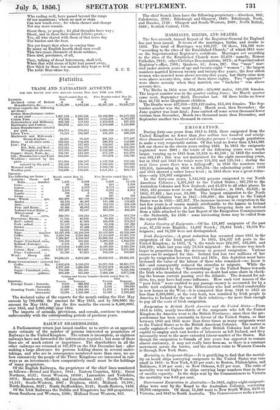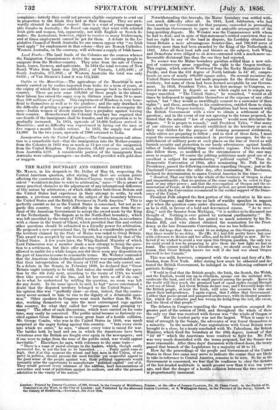EMIGRATION.
During_ forty-one years from 1816 to 1855, there emigrated from the United Kingdom no fewer than four million two hundred and ninety- three thousand seven hundred and sixty-five persons !-enough population to make a very respectable nation. Of this total no fewer than 2,844,961 left our shores in the eleven years ending 1855. In 1815 the emigrants registered were 2081 the totals of the following years were much larger, varying up to 1831 from 12,510 to 83,160; in 1832 the number was 103,140; this was not maintained for the eight succeeding years, but in 1842 and 1843 the totals were 118,592 and 128,344; during the next three years there was a falling-off ; in 1846 the numbers were 129,851, increasing in 1852 to 368,764-the culminating point ;• 1853 and 1854 showed a rather lower level ; in 1855 there was a great reduc- tion-only 176,807 emigrated.
In the forty-one years, 1,132,963 persons emigrated to our North American Colonies ; 2,591,945 to the United States ; 507,783 to the Australian Colonies and New Zealand; and 61,074 to all other places. In 1825, 485 persons went to our Southern Colonies ; in 1341, 32,625; in 1852, 87,881; last year, 62,309. The largest emigration to the North American Colonies was in 1847-109,680; the largest to the United States was in 1851-267,357. The immense increase in emigration in the last few years is of course mainly attributable to the famine in Ireland and the gold-discoveries in Australia. The foregoing facts are derived from a table attached to the last Report of the Emigration Commissioners -the Sixteenth, for 1856: some interesting items may be culled from the report itself.
Native Country of Emigrants.-Of the 176,807 emigrants of the past year, 57,132 were English; 14,037 Scotch ; 78,854 Irish ; 10,554 Fo- reigners; and 16,230 were not distinguished.
Irish Emigration.-A great reduction has occurred since 1851 in the emigration of the Irish people. In 1851, 254,537 left ports in the United Kingdom • in 1852, '3, '4, the totals were 224,997, 192,609, and 150,209; while last year only 78,854 migrated : the decrease was much larger in proportion than the decrease in general emigration. Various causes can be assigned for this. Ireland had lost two millions of her people by emigration between 1841 and 1854; this depletion must have increased the value of the labour of those who remained-we know it did-and consequently reduced the stimulus to migrate. While the enmity exhibited by the "Knownothings " in the United States towards the Insh who inundated the country no doubt had some share in check- ing the human current passing over the Atlantic. The demand for sol- diers, too, may have had some influence. How such vast masses of the "poor Irish' were enabled to pay passage-money is accounted for by a noble trait exhibited by those Hibernians who had settled comfortably in new homes in the West-it is computed that from 1848 to 1855 no less than 8,393,000/., at the very least, was remitted by Irish people in America to Ireland for the use of their relatiyes,-far more than enough to pay all the costs of Irish emigration.
Emigration to British North America and the United States.-Froza 1816 to 1834, nearly two-thirds of the emigrants who left the United Kingdom for America went to the British Provinces; since then the pre- ponderance has been constantly in favour of the United States, so that between 1835 and 1855 more than three times as many emigrants went to the United States as to the British American Colonies. The matter is easily explained-Canada and the other British Colonies had not the capital to employ such vast hordes of labourers as left Ireland, and they necessarily went to the more extended labour-market of the States. But though the emigration to Canada of late years has appeared to remain almost stationary, it may not really have been an, as there is a constant movement across the border, and the shortest route to Western Canada is through New York State.
Mortality in Emigrant-Ships.-It is gratifying to find that the mortal- ity on board ships conveying emigrants to the United States was very small in 1855: to New York, 0.23 per cent; to Boston, Philadelphia, and Baltimore, 0.10 per cent; to New Orleans, 0.27 per cent. The ratio of mortality was not higher in ships carrying large numbers than in those of smaller capacity. In the ships sent by the Commissioners to Victoria the mortality was 0.63 per cent.
Government Emigration to Australia.-In 1855, eighty-eight emigrant' ships Were sent by the Board to the Australian Colonies, conveying 28,016 emigrants. Of these, 11,600 went to New South Wales, 6318 to Victoria, and 9947 to South Australia. The Commissioners make nnovel complaint—latterly they could not procure eligible emigrants to send mit in proportion to the funds they had at their disposal. They are awk- wardly situated in another respect : there is a want of young marriage- able females in Australia ; the Board can supply that want with selected Irish girls and women, but, apparently, not with English or Scotch fe- males; the Australians, however' object to receive so many Irishwomen, and at times employment cannot be got for them. A debate in the Le- gislative Council of South Australia let one reason appear why "no Irish need apply" for employment in that colony—they are Roman Catholics. Western Australia, on the contrary, will welcome a supply of Irish lasses.
Land Funds.—The land funds of the Colonies are the sources whence the Emigration Commissioners derive the means for assisting people to emigrate from the Mother-country. They arise from the sale of Crown lands, leases, licences; and quit-rents. In 1854 the total revenue of New South Wales from lands was 324,9911.; of Victoria, 1,426,4481.; Of South Australia, 377,303/. of Western Australia the total was only 64331.; of Van Diemen's Land it was 112,2261.
(belies in the Haurititts.—The agriculture of the Mauritius is now mainly carried on by coolies imported from India for a term of years, at the expiry of which they are entitled to a free:passage back to their native country. There are now some 135,000 f.these people in the island; their labour has raised the sugar crop in thirteen years from 70 to more than 200 millions of pounds. This employment of llindoos is very bene- -ficial to themselves as well as to the planters ; and the only drawback is the difficulty of getting a proper proportion of females to accompany the men—Indian women of decent station have a prejudice against leaving their country. Henceforward the Colonial Secretary has required that one-fourth of the immigrants shall be females, and the proportion is to be gradually increased. In 1854, upwards of 18,000 Indians arrived in Mauritius ; and no difficulty was experienced in hiring out the men at five rupees a month besides rations. In 1855, the supply was about 14,000. In the two years, upwards of 7000 returned to India.
Immigration into the United Eingdom.—The Commassioners call atten- tion to a remarkable fact—that the immigration into _the Mother-country from the Colonies in 1855 was as much as 13 Der cent of the emigration from the United Kingdom. From Amerita 18,402 persons arrived, and from Australia 4419. A considerable portion of the immigrants from Australia were cabin-passengers--no doubt, well provided with gold-dust or nuggets.



































 Previous page
Previous page